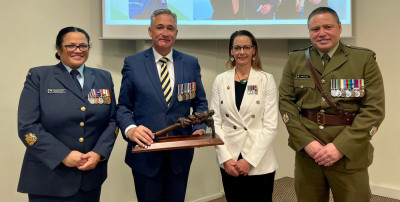Dave Samuels: What veterans could bring to the public service
Dave Samuels: What veterans could bring to the public service
Te Puni Kōkiri and Ngā Ara Whakatupuranga | New Frontiers
It’s very difficult to find fault with Dave Samuels’ logic.
“You only need to read the news to see that the Public Service is struggling to deliver the outcomes that Māori need and deserve. That is the situation we are facing right across our agencies whether it be in justice, health, housing, education or employment.”
“Put simply, the Public Service is screaming out for Māori Leaders to assist them in the delivery of their services and obligations to Māori citizens but there is a paucity of Māori leaders in the Public Service.”
His solution is to create a pathway for Māori veterans to get into the public service.
That pathway is Ngā Ara Whakatupuranga | New Frontiers — a programme for Māori service people from any of the forces to transition through Te Puni Kōkiri to a career in the wider Public Service.
Dave Samuels is the Te Tumu Whakarae mō Te Puni Kōkiri | Secretary for Māori Development at Te Puni Kōkiri.

Left: Graduating from the Ngā Ara Whakatupuranga are Warrant Officer Ngatasha Mana, RNZAF, Warrant Officer Class One Dawn Boxer (Retired), Warrant Officer Class One William ‘Billy’ Cook (Dave Samuels second from the left).
He knew that NZDF had the right people because Dave is a veteran. Following his Dad, Dave joined the Royal New Zealand Infantry Regiment (RNZIR) in 1978 as a Rifleman. First posted to the 2nd/1st Battalion RNZIR and then to the 1st Battalion RNZIR in Singapore.
In 1983 Dave was selected for officer training and graduated as a Second Lieutenant.
From 1985 to 2003 he held a range of command and operational appointments. He was in Singapore and Malaysia and saw operational service in the Sinai, Bougainville, and with the United Nations in Lebanon, Syria, and East Timor.
He transferred to the Royal New Zealand Air Force in 2003, then retired from the Defence Force in June 2004 after twenty-six years of service.
Since 2004 Dave has had policy and leadership roles at the Department of Corrections, the Ministry for Primary Industries and the Ministry of Foreign Affairs and Trade. He took up the role as the Secretary for Māori Development in 2019.
He believes that veterans have the values, skills and experience that would be valuable in the public service. The first is a commitment to service.
“Veterans have a strong sense of service” that has similarities to the “spirit of service” ethos we adopt in the public service, a commitment to make our country, our whānau, and our communities a better place.”
“They also have leadership skills. Leading in the forces is much more than the common perception of just pulling rank, those leadership skills are taught and then practised.”
“The other skill that served me well in my career, and that veterans will be familiar with, is situational awareness. It is the appraisal and understanding of a situation and the context in which you are working. Very valuable in the field on operations, but also in the public service, understanding the context in which you are working helps you to get things done and bring people with you.”
Dave’s thoughts about what veterans could bring to the public service, echo his own service experience and that of many veterans.
“These are the values and skills for nation-building. This is what New Zealand forces have done offshore in Afghanistan, Somalia, Iraq, Bougainville, East Timor and more recently in New Zealand.”
“It's an opportunity for people who have spent a lifetime in the NZ Defence Force to return to their people to continue to serve and help build a nation.”
This article was originally published in the Veterans' Affairs Magazine.
Read the full edition of Veterans' Affairs Magazine Autumn 2022 [PDF, 13 MB]